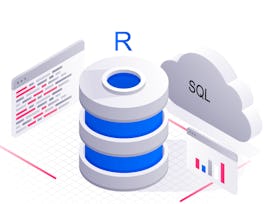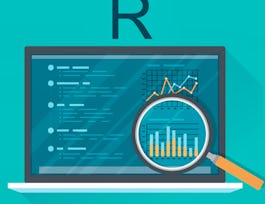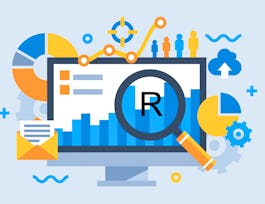When working in the data science field you will definitely become acquainted with the R language and the role it plays in data analysis. This course introduces you to the basics of the R language such as data types, techniques for manipulation, and how to implement fundamental programming tasks.


Introduction to R Programming for Data Science
This course is part of multiple programs.
Taught in English
Some content may not be translated

Instructor: Yan Luo
39,958 already enrolled
Included with 
Course
(422 reviews)
94%
What you'll learn
Manipulate primitive data types in the R programming language using RStudio or Jupyter Notebooks.
Control program flow with conditions and loops, write functions, perform character string operations, write regular expressions, handle errors.
Construct and manipulate R data structures, including vectors, factors, lists, and data frames.
Read, write, and save data files and scrape web pages using R.
Skills you'll gain
Details to know

Add to your LinkedIn profile
9 quizzes
Course
(422 reviews)
94%
See how employees at top companies are mastering in-demand skills

Build your subject-matter expertise
- Learn new concepts from industry experts
- Gain a foundational understanding of a subject or tool
- Develop job-relevant skills with hands-on projects
- Earn a shareable career certificate


Earn a career certificate
Add this credential to your LinkedIn profile, resume, or CV
Share it on social media and in your performance review

There are 5 modules in this course
Regardless of the programming language you use, all share some commonalities. For example, you’ll likely need to perform basic operations on different data types, like applying mathematical equations to numeric data. You’ll also need an environment in which to write your code, anbbd most modern integrated development environments (or IDEs) provide features that make writing code easier, like syntax checking, color coding, and integrated help. This module introduces you to the R language, its common data types, and techniques for manipulating them. You’ll also learn about the role of the R interpreter and how it transforms code into executable objects. Finally, you’ll be introduced to two of the most common IDEs for R development: RStudio and Jupyter Notebook.
What's included
7 videos1 reading2 quizzes2 app items
The R language supports many types of data structures that you can use to organize and store values in your code, including vectors, factors, lists, arrays, matrices, and data frames. Each data structure type serves a specific purpose and can contain specific kinds of data. So, it’s important to understand the differences between them so you can make the right choice based on your scenario. In this module, you’ll learn about the types of data you can store in each data structure and how to add, remove, or manipulate its contents.
What's included
5 videos1 reading2 quizzes3 app items
As with most programming languages, R supports coding features that you can use to control the flow of program execution, define functions that can perform specific tasks, work with common data types, like strings and dates, and make your code more robust by intercepting likely errors and handling them before they interrupt the execution of your code. In this module, you’ll learn how to implement these fundamental programming tasks in R.
What's included
6 videos1 reading2 quizzes3 app items
Data is everywhere! The data you need to analyze may come from a traditional database, but it may also come from a variety of different sources and systems, and it may come to you in one or more formats. For example, your data might be in text, Excel, .JSON, or .XML files. Or it may not be stored in a file at all, but instead lives on the pages of a website. How will you take all these different file formats and load them into your R working environment? This module provides you with the tools you need to read data from some common file formats and sources into data objects that you can then use and combine with other data objects in your data analysis.
What's included
5 videos1 reading2 quizzes3 app items
What's included
2 readings1 quiz1 peer review1 app item1 plugin
Recommended if you're interested in Data Analysis
Why people choose Coursera for their career




Learner reviews
Showing 3 of 422
422 reviews
- 5 stars
71.29%
- 4 stars
20.70%
- 3 stars
3.05%
- 2 stars
1.17%
- 1 star
3.76%
New to Data Analysis? Start here.

Open new doors with Coursera Plus
Unlimited access to 7,000+ world-class courses, hands-on projects, and job-ready certificate programs - all included in your subscription
Advance your career with an online degree
Earn a degree from world-class universities - 100% online
Join over 3,400 global companies that choose Coursera for Business
Upskill your employees to excel in the digital economy
Frequently asked questions
Access to lectures and assignments depends on your type of enrollment. If you take a course in audit mode, you will be able to see most course materials for free. To access graded assignments and to earn a Certificate, you will need to purchase the Certificate experience, during or after your audit. If you don't see the audit option:
The course may not offer an audit option. You can try a Free Trial instead, or apply for Financial Aid.
The course may offer 'Full Course, No Certificate' instead. This option lets you see all course materials, submit required assessments, and get a final grade. This also means that you will not be able to purchase a Certificate experience.
When you enroll in the course, you get access to all of the courses in the Certificate, and you earn a certificate when you complete the work. Your electronic Certificate will be added to your Accomplishments page - from there, you can print your Certificate or add it to your LinkedIn profile. If you only want to read and view the course content, you can audit the course for free.
If you subscribed, you get a 7-day free trial during which you can cancel at no penalty. After that, we don’t give refunds, but you can cancel your subscription at any time. See our full refund policy.





